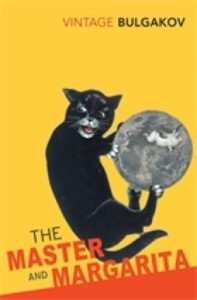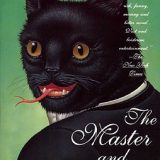The Master and Margarita – Mikhail Bulgakov – 1966
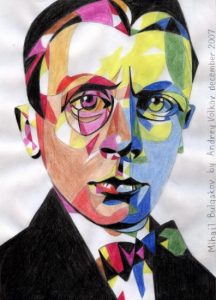
Posted by LadyPurple on 5/1/2005, 20:00:41
* the cat has a penchant for cheese and vodka…
* the cat talks and gets offended if you refer to him as “Puss in Boots”…
* the cat pays its own fare when it travels by streetcar…
What else? Is he just funny, magical, hilarious or is there more to it? Some sinister meaning for the cat?
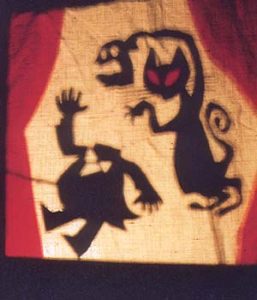
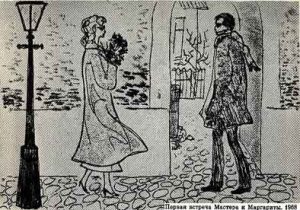
“…As he guarded the door, Varenukha jumped up and down beside it, staying suspended in the air for a long time and swaying back and forth. Hissing and smacking his lips, he winked at the girl in the window and pointed at Rimsky. The girl then doubled her efforts and stuck her red head through the fortochka, stretching her hand as far as it could go. …Her hand began to stretch as if it were made of elastic and became covered with a corpse-like greenness. …Rimsky gave a faint cry, pressed against the wall, and held out his briefcase in front of him as if it were a shield. He knew his end had come.” (Ch. XIV, Praise Be to the Rooster)
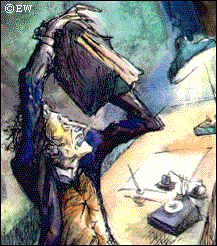
Behemoth (Begemot) — Posted by Paul L on 5/1/2005, 21:30:41
My favorite image of Behemoth… (the most amiable character of Woland’s retinue)
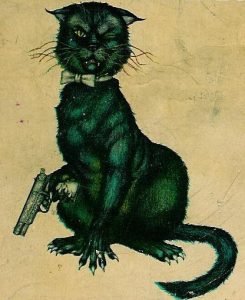
A guide — Posted by Paul L on 5/1/2005, 21:34:49
I thought I would share with you the various links I gathered as I was reading The Master & Margarita.
Mikhail Bulgakov- The Master and Margarita
C’est l’une des plus subtiles ruses du malin
que d’avoir incité ceux qu’il ourmentait a douter de son existence…
– Baudelaire
Master and Margarita Texts
Original text (in Russian)- with illustrations
~~~ http://lib.ru/BULGAKOW/master.txt
Michael Glenny translation
~~~ http://lib.ru/BULGAKOW/master_engl.txt
Richard Pevear and Larissa Volokhonsky translation
~~~ http://lib.ru/BULGAKOW/master97_engl.txt
Annotated Guides
Kevin Moss’s (Middlebury College) Web-based Annotated Guide
~~~ http://cr.middlebury.edu/public/russian/Bulgakov/public_html/
Other works associated with M & M
Goethe’s Faust (Tony Kline translation)
~~~ http://www.tonykline.co.uk/klineasfaust.htm
Goethe’s Faust (Charles Brooks trans.)
~~~ http://www.gutenberg.org/etext/14460
Goethe’s Faust (Bayard Taylor trans.)
~~~ http://www.gutenberg.org/etext/14591
Gounod’s Faust
~~~ http://www.charles-gounod.com/vi/oeuvres/operas/faust.htm
Farrar’s Life of Jesus Christ
~~~ http://christianwritings.net/title.htm
Renan’s The Life of Jesus
~~~ http://www.infidels.org/library/historical/ernest_renan/life_of_jesus.html
Gospel of Nicodemus
~~~ http://www.earlychristianwritings.com/text/gospelnicodemus.html
Death of Pilate (Apocrypha)
~~~ http://www.newadvent.org/fathers/0812.htm
Azazello (Azazel)
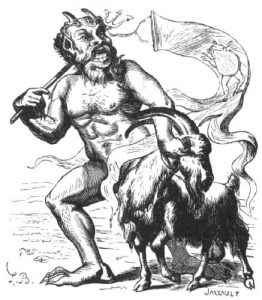
Azazel (from the Jewish Encyclopedia)
~~~ www.jewishencyclopedia.com
The Book of Enoch
~~~ http://www.ancienttexts.org/library/enoch/
Behemoth (Begemot)
Behemoth (from the Jewish Encyclopedia)
~~~ www.jewishencyclopedia.com
Behemoth
~~~ http://www.deliriumsrealm.com/delirium/mythology/behemoth.asp
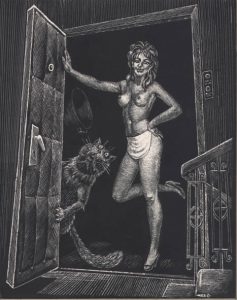 Chapter 10
Chapter 10
Jesus – the most famous historical proof — Posted by Pierre on 6/1/2005, 13:57:23
The most famous proof of an historical character called Jesus can be found in the writings of the Roman historian Publius Cornelius Tacitius (born between AD 54 and 56, dead ca.120), who, describing the reign of strange and cruel Nero, in his book called “Annals”, tells us about the great fire which destroyed Rome in AD 64 (Book XV, part 44) :
“But all human efforts, all the lavish gifts of the emperor, and the propitiations of the gods, did not banish the sinister belief that the conflagration was the result of an order. Consequently, to get rid of the report, Nero fastened the guilt and inflicted the most exquisite tortures on a class hated for their abominations, called Christians by the populace. Christus, from whom the name had its origin, suffered the extreme penalty during the reign of Tiberius at the hands of one of our procurators, Pontius Pilatus, and a most mischievous superstition, thus checked for the moment, again broke out not only in Judaea, the first source of the evil, but even in Rome, where all things hideous and shameful from every part of the world find their centre and become popular. Accordingly, an arrest was first made of all who pleaded guilty; then, upon their information, an immense multitude was convicted, not so much of the crime of firing the city, as of hatred against mankind. Mockery of every sort was added to their deaths. Covered with the skins of beasts, they were torn by dogs and perished, or were nailed to crosses, or were doomed to the flames and burnt, to serve as a nightly illumination, when daylight had expired.”
My textual source : http://classics.mit.edu/Tacitus/annals.11.xv.html
My personal opinion on this subject is that the founder of a separatist jewish sect really existed in Palestine in the beginning of the first century, setting in motion this vast mediterranean religious movement called christianity. If he really walked on the waters and resurrected dead people, is a question I have no answer for.
By the way, some people in the world still believe that Napoleon is just a solar myth (!!!)
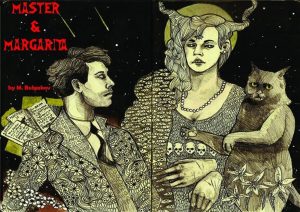
Posted by Lale on 6/1/2005, 16:39:32
Hi Pierre, Happy New Year. Thank you. That was exactly what I wanted to mention but the book was upstairs and I was too lazy to go get it. Here it is now:
“… Mikhail Alexandrovich also informed the poet, in passing, that the passage in Book 15, Chapter 44 of Tacitus’s famous Annals, where mention is made of Jesus’s execution, is nothing but a later, fraudulent interpolation.”
Then, I read the notes at the end of the book:
“When he [the character above, Mikhail Alexandrovich] turns to historical references, however, he is often in error, which Bulgakov leaves the reader to find out — the reference to Jesus in Tacitus, for example, was not considered fraudulent by all scholars of the times. The conflict between the historical school (Jesus really existed) and the mythological school (just another virgin birth, another creation legend, etc.) which was raging in biblical studies’ circles from the eighteenth century onward, …”
There was a raging conflict between two schools from 18th century onwards and nobody had informed me 🙂
Anyway, Pierre, how much do you trust this Tacitus guy?
Lale
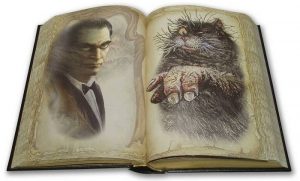
Posted by Pierre on 8/1/2005, 15:32:45
I think we can quite reasonably trust what Tacitus has written. But, as you know, ancient greek and roman literature came to us through english medieval copies of french medieval copies of flemish medieval copies of italian medieval copies of latin medieval copies of old tattered roman manuscript copies of much older egyptian-greek manuscript rolls copies of…
Reliable, let’s say, at 60% in my opinion. The monks of Middle-Ages and Italian humanists of the Renaissance were not always reliable, but they were serious people doing a good job when doing illuminated manuscripts or printing the first books.
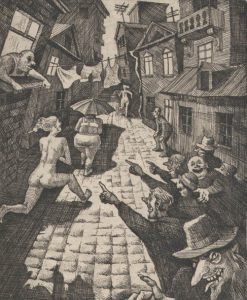 Chapter 14
Chapter 14
Historical Jesus — Posted by Paul L on 6/1/2005, 18:13:37
Depending on how interested you are in the topic, you may want to browse Albert Schweitzer’s The Quest of the Historical Jesus.
Also, while I have not yet read Renan’s The Life of Jesus or Farrar’s Life of Christ, I personally found Shusako Endo’s A Life of Jesus to do exactly what Berlioz accused Bezdomny of. I would recommend reading it. I am a great fan of Endo.
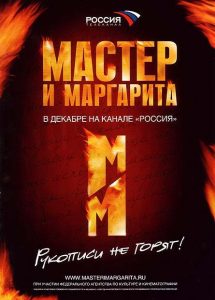
Posted by Lale on 7/1/2005, 10:54:29
: I personally found Shusako Endo’s A Life of Jesus to do exactly
: what Berlioz accused Bezdomny of. I would recommend reading it. I am a great fan of Endo.
I don’t quite understand. Berlioz accused Bezdomny of making Jesus sound like a real person, who lived and died. Bezdomny portrayed a dark picture, not flattering but Berlioz wanted the poem to say that Jesus never existed. So, what does this author, Endo, do/say to be similar to the poet in the book, bad mouthing Jesus?
By the way, last night (in chapter three) something very gruesome happened. I was so sad.
Lale
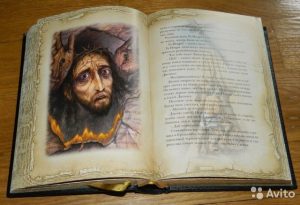
Posted by Paul L on 7/1/2005, 18:14:11
Hi Lale,
No no, in other words, Endo makes Jesus a living person. Anyhow, I would also recommend Endo’s Silence. I would say that it depends on your religious/spiritual views- it either resonates or not.
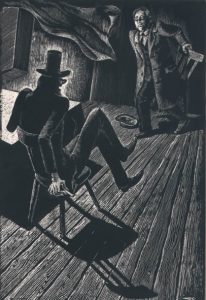 Another illustration from Chapter 14
Another illustration from Chapter 14
Posted by Lale on 8/1/2005, 11:13:27
: found Shusako Endo’s A Life of Jesus to do exactly
I will most definitely keep this book (as well as Silence) in mind. I looked at the amazon reviews and for “A Life of Jesus” someone says that it was written with the Japanese audience in mind. Is that true? If there are references to ancient Japanese teachings/religions/traditions that we don’t know about then it might be hard to understand.
The notes at the back of the book are very useful, by the way. I read one chapter, then I turn over to the end and read the notes on that chapter.
Lale
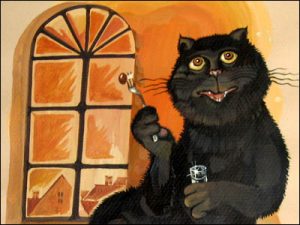
Posted by Paul L on 8/1/2005, 16:30:34
Hi Lale
Endo’s presentation of Jesus is one that supposedly resonates with the Japanese psyche. I cannot comment on this claim but this was explicitly Endo’s aim.
In his words: “The religious mentality of the Japanese is responsive to one who ‘suffers with us’ and who ‘allows for our weakness,’ but their mentality has little tolerance for any kind of transcendent being who judges humans harshly, then punishes them. In brief, the Japanese tend to seek in their gods and buddhas a warm-hearted mother rather than a stern father. With this fact always in mind I tried not so much to depict God in the father-image that tends to characterize Christianity, but rather to depict the kind-hearted maternal aspect of God revealed to us in the personality of Jesus.”
I can say that it resonated with me for numerous reasons, including my own belief that no one, including (especially?) his disciples, understood him. The religion we now have in his name is also based upon this misunderstood life.
And onto more M&M talk- I found a lit crit book on M&M during a trip to the local used bookstore, but opted not to purchase it. I am still thinking about M&M and attempting to formulate any interesting questions it left me with.

Migraines — Posted by Lale on 7/1/2005, 11:06:41
As a migraine victim myself, I found Bulgakov’s description of Pilate’s “hemicrania” very accurate: “…shoots pain through half my head… there’s no remedy for it, no relief… I’ll try not to move my head…”
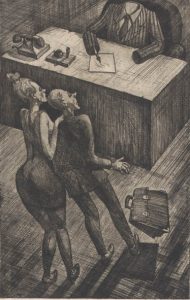 Chapter 17
Chapter 17
M&M and Communism — Posted by Lale on 17/1/2005, 15:03:03
Is there any interest in discussing the defects (as offered in The Master and Margarita) of communism?
Not like the overdone “communism: is it good or bad” or “communism vs capitalism” discussions. Those are processed to death for many decades, and never very constructively either.
I am more thinking of a group effort to make a list of factors that have contributed (in various degrees) to the failure of communism (at least in the Soviet Republics). I know that an overwhelming majority thinks poorly of such a system as we read in M&M. But couldn’t we play the devil’s advocate (pun intentional) and try to figure out what could have been done differently to make such a system work? Like a post-mortem, why did communism fail, did it ever have a chance? If *you* tried to do it, how would you do it?
Is there any interest in this?
I think today such a discussion is possible when in the past it would turn friends into enemies. I don’t think there is such a danger now. Communism used to arouse strong sentiments on both sides, for and against. Now neither party couldn’t care less. So, it should be possible to talk about it without offending one another.
I was never truly comfortable with the books packaged as “masterpieces” by the West just because they criticized communism (sometimes credibly, written by authors who lived through it). I have always thought that even though the author’s account might be fully, or to some degree, accurate, since the West picked it up and “used” it (Solzhenitsyn, Pasternak, Kundera), it is propaganda material, therefore one needs to exercise caution.
For some reason communism seems to be against human nature. And I suspect we can generate some exciting discussions around it.
Any takers?
Lale
~
Posted by Hanh on 18/1/2005, 0:41:57
I think there is a difference between Communism with Capital C (the idea), and communism with small c (the implementation).
As an idea, Communism is good. What’s there not to like: equal distribution, to those who needs — his share, from those who can — his work. But, in practice it’s bad because Communism does not take in consideration Human Nature, which follows more along the line of: what’s mine is mine, and what’s yours is mine.
The failure of Communism to realize the social utopia it claims is the result of the failure of People to live up to any Ideal. It’s the same irony as the failure of Religion to bring Peace. Perhaps perfect ideals cannot be realized by imperfect implementers with imperfect tools (selfish nature), and any experiment claiming to do so is doomed from the start.
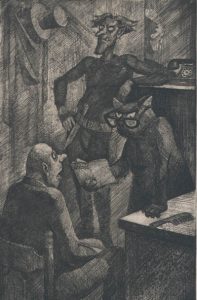 Chapter 18
Chapter 18
Posted by Lale on 18/1/2005, 9:06:02,
Hanh, it is so good to see you again. You have spoken the truth yet again.
But aren’t there some tribes in Africa or in East Asia…? They work, they harvest, they hunt, they build, they eat … All together? Nobody is hungry or homeless?
Remember the book we read: Shipwrecks. Wasn’t that a communist society? Each fisher kept his own catch but when they had the ship crash on the shore, they shared the rice and all the other goods. They shared them based on the number of people in each family.
Sometime in the past, some communities have been able to manage some sort of a life style where no one was left out of the loop, no privileges. But the main or only concern was food and shelter.
The simplicity of life has something to do with it. Is it safe to say that anything beyond food and shelter is “up for grabs”?
Lale
~
Posted by Paul L on 18/1/2005, 7:04:14
Or to put it more succinctly- the failure of communism is the necessary reliance on humanity to implement it. In this sense, I agree with Lale that it is “against human nature” – but I suspect that isn’t the way she intended it.
~
Posted by Lale on 18/1/2005, 9:33:58
: Or to put it more succinctly- the failure of communism is the necessary reliance on humanity to implement it.
: In this sense, I agree with Lale that it is “against human nature” – but I suspect that
: isn’t the way she intended it.
I think I did mean it the way you understood it.
Here is an attempt to explain myself:
I do think communism (as we have seen in Russia) is indeed against human nature. Human beings are wired to care for their own ilk, their own folk above and beyond anything or anyone else. They favour their own child, sibling, uncle, cousin over their neighbour. This is just in us, we are hardwired that way.
So, when you have the choice between
– fully feeding (educating, dressing etc.) your child
and
– half-feeding your child and giving the other half to the neighbor’s child,
you choose the former. This is in your nature. If you are told to do the latter, then you cheat. I don’t know if cheating is in human nature or not, but we do cheat a lot. So we have bribery, corruption…
Some other thoughts, just briefly, on why communism failed:
1. I think it is ridiculous to tell people what to believe and what not to believe. I think the churches and the mosques and christmas and all of the religious traditions and symbols should have stayed. People don’t change their belief system just because they are told to do so.
2. I think communism cannot be achieved in just one country. It has to be global. All of world’s resources (which may still be plenty for everyone if managed well) should be offered to everyone.
I would love to discuss the education aspect as well, although I don’t have the time for it right now. Most people are just lucky to get an education. We are nowhere near offering the chance at a decent education to all kids. So, the educated automatically think that deserve all the riches. They studied hard, got a degree and now have a good job. They are not going to part with any of it. But it is luck that gave them the opportunity of an education in the first place. But, this is too long a story. I will try to expound on it later. Please do comment.
Lale
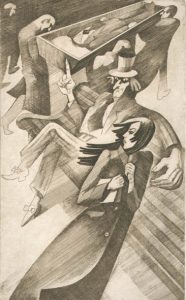 Chapter 19
Chapter 19
Posted by Guillermo Maynez on 18/1/2005, 10:58:16
Dear Lale and friends: Communism has been the most evil political regime in the world, maybe even worse than Nazism and Fascism, close relatives. Why? Because it is the absolute negation of freedom. I am impressed that the question of freedom has not come up in this discussion as the most important concept on this subject. Communism has everywhere been a system in which a few, very few people represent themselves as speakers for “the people” and then proceed to kill and imprison all those who are against “the people”, that is, whatever they desire. No voting, no freedom of expression, only one political party and absolutely no accountability… if you demand the former, you are an enemy.And by the way, no environmentalists, no human rights NGO’s and so on. Freedom is the most precious value we humans have. People risk their lives everyday to run away from the people’s paradise in Cuba in order to have a chance at the evil empire of the US. Curiously, nobody runs away from the US to enjoy the delicacies of Castro’s huge prison.
Freedom is the key. All communist systems necessarily destroy freedom because the use we make of it makes us different, and so equality can only be maintained at the price of utter poverty, ignorance and lack of liberty.
Two more points: as for the idyllic communism of tribes, etc., I’ve been there for years where the Mexican Indians are, and if that is equality and “primeval democracy”, give Manhattan any day of the week. It’s horrible.
And, dear Lale: education. Education, to me, is a little more that instruction on techniques and other disciplines. Education in Communism is doomed to fail because they can’t teach the kids to think for themselves and question everything. This is the true spirit of science, and it goes against the essence of Communism, where inspired leaders tell you what to think or else. Yes, the Soviet Union used to have very competent scientists, but the lack of freedom made them lose the technological race with the West. Being innovative is risky in Totalitarianisms.
~
Posted by Lale on 18/1/2005, 17:35:42
Clearly it was poorly implemented. But the idea is not evil.
I agree that the freedom of expression was lacking. But for the rest of it … How much freedom does one have if one is starving? Money is freedom. (I see that this is oversimplifying but there is no other choice, we are not going to write a philosophical/economical book here. They are all written, anyway. So, I am just thinking out loud and simplifying.) If you are born into poverty, you’ll never have much freedom. If you are born into a nice family who can support the education/health/etc. expenses, then you’ll have a lot of freedom.
But I agree that the regime must not be forced on the people, it can only work if it is what people want. They don’t want it.
And, my dear Guillermo, you know that each nation teaches their children the history the way they want it to have occurred. I don’t believe a word of history I was thought in school. Everything I know about history, I learned it outside of text books.
Much of what we know about communism comes from the books championed by the West. They can’t be very accurate. I suspect they were exaggerations.
Back to the list of factors that made communism fail: I think a purist form of such a system requires many more years, many more generations than the 70-80 years it had in previous examples.
The bottom line is, people do not want communism. Today, every democratic nation has a communist party. People don’t vote for them.
Lale
~
Posted by LadyPurple on 18/1/2005, 18:41:47
Hi,
I wish I had the time to get more involved in this discussion… anyway, here are a few random reactions.
1. No state, current or past has been “communist” in the Marx definition – they are socialist (if that). To claim that they achieved a “communist society” in their country, does not mean that they have. “Communism” is supposes to be the “ideal” (idealistic?) end stage of a development process that includes the dictatorship of the proletariat, and at some point processes for equality of the people as well as adequate food, housing, healthcare, education, etc.
2. Some analysts compare communism with the early Christian community – an equal society based on choice, mutual understanding and caring for each other.
3. While I agree with much of what has been said here so far, I think it is important to differentiate between the ideology of “communism” and the reality of socialism as it has been developed in the former Eastern Bloc and other countries.
4. Whether communism is against human nature? I don’t know and I would not be that absolute on it. There have been societies that contain various elements of a communist society in the past that could argue against such generalization. Even East Germans, as an example, with all the strong feelings they harboured against their socialist state, now that it is gone, they miss certain services and institutions that they took for granted: free child care, full employment, equal opportunity for women, free healthcare, free education, adequate pensions, cheap housing, etc. Many did not realize that with the yearned for “freedom” of the west came numerous disadvantages…
Nothing is perfect, we all know that. But the shockwaves for the “Ossies” continue to create misery and unhappiness.
5. Freedom is not all that shines… Why else are the Russians today going back to vote for a president who upholds many of the policies and strictures of the Soviet past? Many have been complaining that life was better in the old days… You can’t buy much with freedom, unfortunately. Canada is labeled for its “socialist healthcare”, but honestly, I prefer the Canadian Medicare and Pension plans to what seems to come down the pipe in the US with privatized Social Services – in the name of freedom…
6. I do have to object to the comment that “communism” is more evil than “fascism” or “nazism”. Socialists states have come in all shapes and sizes…However, DICTATORS come from all political directions and they are bad news whatever system they proclaim to represent.
7. Russia, to get us closer to M&M has been a dictatorship for a very long time… censorship, labour camps, exile and such were not new under the Soviet regime. People had learned to cope with the authorities as best they could, whether peasant, worker or intellectual elite.
Finally, I don’t have a lot of confidence in “human nature” reflecting anything good or of high ethical order. We personally may do that and cherish personal freedom above all else, but I assure you that we are in a minority on this planet and – if we want to save this planet for our children and grandchildren, we better start soon to give up some of that freedom for the “Global Commons” and the people less advantaged than we are…
Sorry to go on and without extensive self-editing.
Friederike
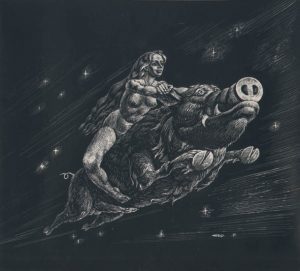 Chapter 21
Chapter 21
Posted by Hanh on 18/1/2005, 23:10:11
Friederike summarized it well. There is an essential difference between the political philosophy of Communism and its (ultimately disappointing) implementation as a human experiment. The same however, can be said of the political philosophy of Democracy as measured against the implemented variations of democracies in the world today, including that of the United States. As Martin Luther King noted, ours is an “anemic democracy”. Yet, I would not trade it for anything else. Anemic democracy is certainly nicer than tyranny.
Is Communism against human nature? Perhaps not against specific INDIVIDUAL human natures, but may be against Human Nature as a mass entity.
I think there is a change in dynamics that occurs when we jump scale, for example from Psychology (study of the individual psyche) to Sociology (study of society’s psyche) — different rules apply on different scales.
The “scale-gap” is the same “disconnect” that prevents the formulation of a Unified Theory, a single set of rules, to marry Einsteinian physics of the macro world with the world of electrons. What’s good for the individual is not necessarily good for the society as a whole, and vice versa — often it seems the same rules paradoxically CANNOT apply. Should society save ALL brain-damaged babies at cost of billions to tax payers? Should MY brain-damaged baby be saved at cost to tax payers?
I am reading a book called Guns, Germs and Steel about geophysical and “non-biological” reasons for the disparate development of different cultures and areas around the world. One of the things it posits is that the tribal/clan-based social structure CANNOT be sustained once the population gets above a certain number. “Community”, Community-living (and the close-knit, give-and-takeness that applies) CANNOT exist when the population becomes too large. Rules change as the scale changes.
Perhaps it can be said that Marxist Communism could exist in small scale where people’s social dynamics toward each other are different (more caring). However, as a social policy governing nations, the centralization of distribution of goods relies too much on the “goodness” of the distributors, and hence ripe for corruption and abuse, because when there is no more sense of Community, people no longer care as much — that is human nature.
Ultimately, because Communism does not allow openness and transparency, it (inevitably) becomes an excuse for tyranny. For Communism to “work”, it must be run by a “benevolent dictator”, and that is much too random and optimistic a requirement. Without a benevolent dictator, communist experiments become tyrannies.
However, having said that, not all things non-communist is good either. Democracy has its own failures (again, that Human Nature). Transparency in government is the only thing that allows the natural checks and balance built-into Democracy (the ideal) to work. Once that is gone, once the people no longer knows what the government is doing, they can no longer in effect “rule”. That is the beginning of the end for Democracy.
~
Posted by Hanh on 18/1/2005, 23:46:38
I think the fundamental flaw with the Marx’s Communism is that it is too optimistic about human nature. I assumes that in reality the BEST of human nature would prevail, that people would work their best regardless of reward simply because they are able, and take no more than they need. That assumption is doomed to failure. That’s the “against human nature” part.
Democracy however is in-line with Human Nature. As a mass, we’re actually not that noble, not when it comes down to what counts — we’re all watching for #1. Self-preservation is indisputably (biologically) human nature.
Democracy assumes (correctly) that people will compete and work for their own gain, and so it postulates that the aim of government must to establish a fair and level playing field to work on, and let everybody go at it. It doesn’t assume people will be happy taking less than they deserve, like Communism does.
So theory-wise, it could be said that Democracy is the only philosophy in-sync with human nature because it is realistic about the limitations of human nature, and planned for it.
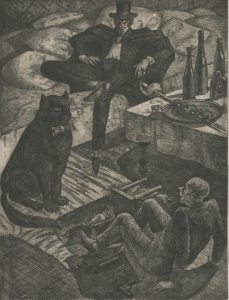 Chapter 24
Chapter 24
Posted by Lale on 19/1/2005, 11:40:18
So, are we to give up on communism completely? As Friederike says, it may be the only way to save the planet for the future generations. Do we care about that?
I said that the communist parties never collect very many votes. (Not that they could do much even if they were elected. All they can do is to extend some social programs. Actually, I’d be very curious to see what they could do. I would give them a chance.) For the sake of argument, let’s imagine this: a world wide vote!!! A referendum on planet earth. The entire population votes. Africa, Asia, everyone. Would the outcome be in favour of a global communism?
(My answer is no. The world, with all its sufferings, would not choose a system that might potentially ease their sufferings.)
I agree with Hanh that small communities have more chance of sustaining, maybe not a full blown communist system, but at least a communal living. They know one another and care for one another. There is a wise old chief everyone respects …
As the community grows, and as the focus shifts from basic needs to little luxurious, the worst in people start coming out.
~
Posted by Hanh on 19/1/2005, 13:03:19
: the sake of argument, let’s imagine this: a world wide vote!!! A referendum on planet earth. The entire
: population votes. Africa, Asia, everyone. Would the outcome be in favour of a global communism?
Lale, my love, you’re sleep-walking again! [heh heh] As a people, we can’t even agree on light or dark beer! 🙂
To ensure happiness, stick with our little commune here, this little slice of utopia. Who knows what lies outside our little portal that could muck up all sense of hope. And I’m speaking from experience here [wink wink].
~
Posted by Andrew on 19/1/2005, 13:41:58
Some old Soviet-era jokes about communism:
Q: Why are Communism and the horizon alike?
A: Both are imaginary points in the distance towards which we march without ever getting any closer.
In a classroom in an elementary school in Armenia:
Student: Teacher, teacher, tell me, is it possible to build communism in Armenia?
Teacher: (thinks a moment) Yes my son, but why don’t you do it to the Georgians first…..
Stalin, Khrushchev, and Brezhnev are riding on a train that stops in the middle of nowhere. After a short while Stalin jumps up and shouts “Shoot one of the engineers, that ought to encourage the others!” They do so, but the train still doesn’t move. Khrushchev gets up and proposes “Let’s double their salaries (the money was worthless and there was nothing to buy)” But the train still doesn’t move. Finally, Brezhnev, who has been snoozing in a corner, opens one eye and says “Comrades, just close the shutters and we can pretend we’re moving!”
Andrew
~
Posted by Andrew on 19/1/2005, 13:27:14
I make a point of not asking direct questions of my many Russian/Ukrainian/Georgian friends about what they did under the old regime. My Vika, who was a party member as prerequisite for her job once told me “The thing I hated most about the Soviet Union (and there ARE many things for which she is nostalgic) is that every day I knew I was telling lies.” Another friend, one of the very few Jews to achieve high naval rank (Kapitan of a nuke sub) most certainly would not have gotten there without party membership and serious ‘enthusiasm’. People did what they had to. No one lived without making some compromises with the system – not even Saint Solzhenitsyn.
But where the darker side lies, I agree with Guillermo. One of my favorite novels is ‘Darkness At Noon’ by Arthur Koestler. It gives great insight into the fanaticism that was fostered under the regime. The protagonist, Rubashov believes it is proper to deceive, steal, even betray, for the good of the party. And when he learns that it is not up to him to decided what serves the good of the party, he even falsely betrays himself in service to the party.
Andrew
~
Posted by Guillermo Maynez on 21/1/2005, 17:59:49
Dear Lale: think about it for a moment and the very idea of communism is evil. And that, of course, is not to say that democracy or capitalism are perfect. They are very imperfect, but they are not evil. Communism, even if it could be perfectly achieved on Earth, is evil: it is inevitably the tyranny of the very very few above the many. And a scientist would live exactly like an ignorant clerk. There would be little point in getting a Ph.D. if you are going to end up in the same apartment as the guy who cleans the street. I know, I know, Britney Spears makes much more money than people who do a lot for us (physicians, engineers, etc.). But that money comes from a lot of people wanting to buy her records, not from an order by some illuminated “leader of the people”. And the history of Communism I did not learn from text books, but from many uncontested testimonials. Communism is evil because it kills your freedom and so it kills your soul.
~
The theme of good and evil in M&M — Posted by LadyPurple on 23/1/2005, 16:04:20
Hi all,
I finished Master and Margarita (again) and pondering the various themes and levels….
One of the essential themes, of course is Good vs. Evil
“p. 305 – Levi Matvei and Wolland – “I’ve come to see you, Spirit of Evil and Sovereign of the Shadows” “what would you do if evil didn’t exist, and what would the earth look like if all the shadows disappeared? After all, shadows are cast by things and people. … But shadows also come from trees and from living beings. Do you want to strip the earth of all trees and living things just because your fantasy of enjoying naked light? You’re stupid.”
I found an interesting study related to this theme today:
“Healthy Blasphemy: Dissenting Discourses in Rushdie and Bulgakov”
Gerald R Lucas, a recent Ph.D. specializing in contemporary American literature and theory, written in October 1997.
http://litmuse.maconstate.edu/%7eglucas/archives/000454.shtml
How are others getting on???
Friederike
~
Posted by Lale on 24/1/2005, 10:16:45
: “p. 305 – Levi Matvei and Wolland – “I’ve come to
: see you, Spirit of Evil and Sovereign of the Shadows”
: “what would you do if evil didn’t exist, and what
: would the earth look like if all the shadows
: disappeared? After all, shadows are cast by things and
: people. … But shadows also come from trees and from
: living beings. Do you want to strip the earth of all
: trees and living things just because your fantasy of
: enjoying naked light? You’re stupid.”
What would happen if evil didn’t exist? I have been sitting here, staring at Freiderike’s posting for the past 15 minutes, pondering this question. I haven’t gotten very far.
I guess if evil didn’t exist then good wouldn’t exist either. Like in animal kingdom. There is no good and evil there. There is only survival, the law of nature.
Lale
~
Posted by Paul L on 25/1/2005, 7:14:50
To me it seems this presupposes a very Western view of ‘good’ and ‘evil’ and I’m not sure that M&M (or Woland) should be looked at in this way. Well, at the very least, I find such a dichotomy confuses me when I come across sections like this:
‘He has read the master’s writings,’ said Matthew the Levite, ‘ and asks you to take the master with you and reward him by granting him peace. Would that be hard for you to do, spirit of evil?’
‘Nothing is hard for me to do,’ replied Woland, ‘ as you well know.’ He paused for a while and then added : ‘ Why don’t you take him yourself, to the light? ‘
‘He has not earned light, he has earned rest,’ said the Levite sadly.
‘Tell him it shall be done,’ said Woland, adding with a flash in his eye : ‘ And leave me this instant.’
Rest? Then why with Woland? This is a reward.
Also, and perhaps reading into this, but Woland seems to (indirectly) place some weight on Margarita’s selfless act for Frieda.. Woland seems like the great Tempter… he allows you enough rope for you to hang yourself but his role is not necessarily to trick you into damning yourself- he is a Skeptic towards human nature…
Even the death of Berlioz – do we have any evidence that Woland orchestrated it? Or is Woland’s crime simply being callous enough to share with an unfortunate individual his unfortunate fate (that has already been written)?
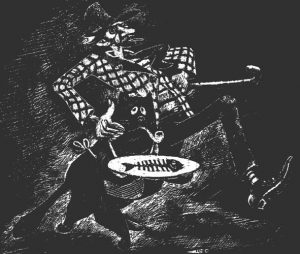 Chapter 28
Chapter 28
Posted by LadyPurple on 25/1/2005, 9:15:22
: To me it seems this presupposes a very Western view of
: ‘good’ and ‘evil’ and I’m not sure that M&M (or Woland)
: should be looked at in this way.
Interesting observation! Does that mean you include Russian christian orthodoxy in “Western view”? Bulgakov follows a tradition of Russian 19th century writers who pondered the good-evil question in some depth, did he not?
BTW, in the Burgin/O’Connor translation, “peace” is used twice and not “rest”. The question remains though, Why does Woland have the responsibility (or authority) for the Master? Good question to which I have no answer… In the subtext of the novel, as a reflection of Stalinist society, it is of course much easier to perceive… Evil has all the power…
: Well, at the very
: least, I find such a dichotomy confuses me when I come across sections like this:
: ‘He has read the master’s writings,’
:
:
: Also, and perhaps reading into this, but Woland seems
: to (indirectly) place some weight on Margarita’s
: selfless act for Frieda..
I don’t think you are reading too much into it! Woland clearly stresses (twice) the importance of Margarita’s concern for Frieda as a reason for grating her “peace” and a life with the Master.
In passages like these we have to keep in mind the Goethe quote that is like the “leitmotiv” of M&M – the power that forever evil wills and forever works for good…
: Woland seems like the great Tempter… he allows you enough rope for you to hang
: yourself but his role is not necessarily to trick you into damning yourself- he is a Skeptic towards human
: nature…
I found the take in Lucas article intriguing: Woland forces decisions and actions from people. He allows you to hang yourself, sure, but he also offers you choices, i.e. the Frieda incident. You cannot remain a passive observer and hide somewhere under his influence… in contrast to what many people tried to do under the Stalinist regime…
: Even the death of Berlioz – do we have any evidence that Woland orchestrated it? Or is Woland’s crime
: simply being callous enough to share with an unfortunate individual his unfortunate fate (that has
: already been written)?
I think the discussion of “fate” deserves a separate discussion. It is juxtaposed to the arbitrariness of Woland and his gang’s actions…
Friederike
~
Posted by len. on 2/2/2005, 11:14:53
Lale cites Friederike’s cite:
>what would you do if evil didn’t exist, and what would the earth look like if all the shadows disappeared?
This perfectly exhibits the fallibility of arguing by analogy. Evil is not a “shadow”.
>I guess if evil didn’t exist then good wouldn’t exist either.
Oh pshaw! Are you such a relativist? Are there truly no absolutes? Why does the existence of good depend on the existence of evil? Does the idea of something require its instantiation? If there were no actual evil in the world, would the idea of evil cease to exist as well?
And what exactly is evil anyway? Does evil require intent, or is indifference sufficient? If it turns out that such intent or indifference is an unavoidable consequence of a mental defect (I personally think that anyone able to deliberately take the life of a conscious entity is mentally defective), does the notion of evil still make sense? Is evil just a name we give to things that we find so repugnant that we can’t understand their possibility?
>Like in animal kingdom. There is no good and evil there. There is only survival, the law of nature.
The only reason we think there is no good or evil in the animal kingdom, if that is indeed the case, is because we choose to believe that animals are unable to choose to be good or evil.
I’m pretty sure that the notion of evil hinges on our notions of free will, which I’m also pretty sure are, if not just wrong, at least illusory or misguided.
len.
~
Posted by Lale on 2/2/2005, 11:29:47
: And what exactly is evil anyway? Does evil require intent, or is indifference sufficient?
I think indifference can be quite evil.
If you see someone suffering and you don’t lend a hand, just watch him suffer, that’s quite evil.
I am starting to think that the notion of “not getting involved”, i.e. “it’s none of my business” is indeed very evil.
I also think that evil and good are linked because they both have degrees, so if you start with good and go down to less good (where “indifference” is kicking in) and if you keep going down a little further …
If there are degrees of good (are there?) then there must be evil. Because, then, how do you call not doing good?
By the way, I wasn’t making any statements. I was just thinking out loud. I ponder these things without reaching any conclusions.
Lale
~
Speaking of the evil — Posted by Lale on 28/1/2005, 16:29:32
May Be a Price to Pay by The Alan Parsons Project?
Something’s wrong in this House today
While the Master was riding the Servants decided to play
Something’s wrong in this House today
Something’s been going on there may be a price to pay
There’s evil brewing, getting out of control
And I’m helpless I can’t put it right
Something’s unrighteous is possessing my soul
And it’s cold in the heat of the night
Something’s wrong in this House today
While the Sorcerer slept the Apprentice decided to play
While the Master was hiding the Servants decided to play
Might be too much Sun or too much of something in the Air
Whatever’s happening nobody else is aware
There’s evil brewing, getting out of control
And I’m helpless I can’t put it right
Something’s unrighteous is possessing my soul
And it’s cold in the heat of the night
Something’s wrong in this House today
Something’s been going on there may be a price to pay
(Woolfson/Parsons 1979)
@
M & M places today — Posted by Andrew on 29/1/2005, 14:18:15
Financial Times (UK)
January 29, 2005
Only approaching normal: Post-Soviet Moscow is an interesting but stressful adventure
By Arkady Ostrovsky
“The Muscovites have changed considerably . . . outwardly, I mean . . . as, too, has the city itself . . Not just the clothes, but now they have all these .. what d’you call ’em . . . tramways, cars,” says Woland, the Devil, in Mikhail Bulgakov’s The Master and Margarita, as he reflects on the 1920s Moscow.
One can only imagine how surprised Woland would be were he to visit Moscow today. Few of the world’s urban centres have changed as rapidly and as drastically over the past 10 years. You can see it in Moscow’s architecture and feel it in its rhythm. The city, long seen as grey and dreary to western eyes, today has more neon lights per square metre, more black Mercedeses per restaurant parking lot and more bodyguards per businessmen than most European capitals.
Long gone are the days when shopping for food meant long queues and empty shelves, and when the choice of evening entertainment was limited to the Bolshoi Theatre or an overpriced drink in the ugly Intourist hotel where you were stalked by prostitutes and KGB informers – often one and the same.
Now, there is no shortage of restaurants, shopping malls, fashion stores, bars, clubs or and western-style gyms. But unfortunately, what Moscow gained in comforts, it lost in character. Some of the city’s finest buildings have been pulled down or replaced with replicas. The authorities seem to be obsessed with destruction and re-building, and many of the older areas are gone forever.
Moscow is still not a “normal” city, despite its outwardly changes. Where else would the traffic police not only take a bribe of some Rbs500 (Pounds 9.50), but also offer you a ride in a police car to beat rush hour traffic if you agree to pay a little extra? Where else can you flag down an ambulance car that is doubling up as a taxi? Moscow blends frustration and adventure; it’s stressful but attractive; and stories of life there make for terrific dinner-party conversation.
Essential to escaping the madness – and the long, dark winters – is a comfortable home. The first thing to consider when choosing a place is whether you want to live in the centre of the city or in the country. There are several compounds less than 10 miles away from the centre which offer all the comforts of suburbia with a Russian twist.
The most famous – and most expensive – country house compound Zhukovka is inhabited by Russia’s rich and powerful, although some houses there have recently been vacated as their owners relocated to London (Boris Berezovsky) or to jail (Mikhail Khodorkovsky). Once home to the Communist party elite, Zhukovka now boasts several multi-million dollar houses; one of the finest and most expensive Russian restaurants, The Tsar’s Hunting Lodge; a modern gym; and a small farmers’ market which sells the finest Russian produce at prices approaching those of Harrods food hall.
Vladimir Putin, Russia’s president, and some of his lieutenants live in close proximity, which may be good for security, but it’s bad for traffic, since the road is closed for his motorcade every morning and every evening.
In central Moscow, the most prestigious and expensive neighbourhoods are situated within the Moscow Garden Ring, an eight-lane wide road that encircles the centre. Although it once lived up to its name – as a pleasant ring of gardens – it is now choked with cars and fumes.
However Patriarchy Ponds – a leafy and quiet (by Moscow standards) area around a pleasant pond – is a highly desirable address, with several good restaurants and cafés, including the popular Dona Clara coffee shop – a popular meeting point for Moscow’s affluent classes. (This is also where Woland, the devil from Bulgakov’s novel, has his first encounters with Muscovites.) Most of the houses are 19th and early 20th century with violent in-crops of Soviet architecture.
Less than a mile east, is another good area situated on either side of Moscow’s main thoroughfare, Tverskaya street. It is more noisy but also more central. Here you are only few minutes away from the Kremlin and the famed Conservatoire, the city’s main classical concert venue, and only a short walk from the Bolshoi. Another favourite for the moneyed classes is Ostozhenka Street – which stretches from the garden ring to the newly rebuilt cathedral of Christ the Saviour.
Across the river from the Kremlin is Zamoscovorechye, an idiosyncratic part of old, low- rise Moscow, which was traditionally occupied by merchants in the 19th century. Much of it has been altered, but it still feels a world away from the noise and bustle of the city centre.
Property prices in Moscow vary hugely from about $3,000 / sq. m. in an old Soviet block of flats, to about Dollars 20,000 in some of the new luxury houses. Services such as heating, gas and electricity are supplied centrally through Moscow’s municipality, and many of the elite houses in Moscow have concierges.
These come either in the shape of retired old ladies or former low-ranking police or KGB officers. The former is often more secure and certainly more friendly.
~
Posted by LadyPurple on 29/1/2005, 18:07:21
Great article find – it just shows how much M&M is a presence in people’s mind.
Here is a complementary piece from 2003…
FEATURE-Moscow literary site saved after residents protest
By Richard Balmforth
MOSCOW, April 1 (Reuters) – It’s been a devil of a dispute.
But residents of an elegant Moscow district, immortalized in a classic Soviet novel in which Satan wreaks havoc in Josef Stalin’s Russia, have won their campaign against city government plans to turn their neighbourhood upside down.
Inhabitants of Moscow’s Patriarch’s Ponds quarter — scene of the opening pages of a cult masterpiece by Soviet satirist Mikhail Bulgakov — have been up in arms over plans to erect a cluster of monuments to honour the author.
The plans envisaged not only a monument to Bulgakov, but a garish 12-metre (40 feet) -high construction in the shape of a paraffin stove, a key symbol of the surrealistic “Master and Margarita” — all heavily promoted by Yuri Luzhkov, Moscow’s no-nonsense mayor with a taste for the monumental.
Accompanying the stove, was to have been a statue of Christ walking on water.
To the horror of residents in the quarter, set in a leafy backwater just off the city’s inner ring road, bulldozers moved in last year and began digging up a pond where Muscovites and their families have ice-skated for more than a century.
Not that Muscovites oppose honouring Bulgakov. On the contrary.
article continues :
http://www.cdi.org/russia/johnson/7126-1.cfm
~
Enormous paraffin stove — Posted by Lale on 30/1/2005, 0:03:31
“Ideas for the massive stove-shaped construction and a statue of Christ walking on the surface of the pond have been scrapped.”
Thank goodness! It would have been such a kitsch. This proves that protests do work.
I enjoyed both articles tremendously. Thank you zusammen.
Lale
~
Posted by Guillermo Maynez on 2/2/2005, 12:48:41
For me, the first thing to say is that the book absolutely deserves its reputation. It is a work in which the most remarkable aspect is Bulgakov’s infinite imagination, a skill for parody and sarcasm, and the impressive changes in rhythm, reminding of Tolstoy’s “War and Peace”, another work with sudden changes of setting, mood, language, and characters.
While I was reading, I was reminded of other authors, apart from Tolstoy. Obviously, and it’s pretty transparent in M&M itself, the ancient Germanic legend of Doctor Faustus was present. Even Dr. Faustus’ beloved’s name was Margarita (or Gretchen as a diminutive in German). The book, I understand, was written in the years immediately previous to WWII and first published in 1940. So there is a sense of foreboding similar to that of Thomas Mann’s “Doktor Faustus”, which metaphorized the coming of Nazism. I was also very much reminded of Dante and his descent into Hell and ascension to Heaven. Finally, Lewis Carroll also came to my mind, primarily from the dialogues of the characters, especially the Cat and his companions. They reminded me a lot of “Alice in Wonderland”, as many dialogues are utterly absurd but intelligent at the same time. I am sure many metaphors, similes and allusions escaped me, but I don’t think that detracted from my enjoyment.
What are the main subjects of this book? I offer here a brief and preliminary list, which I’m sure you guys will correct, expand and widen:
1. Censorship in the USSR and the regime of terror imposed by Stalin. The story of the Master’s misfortunes with the book reflects the cruel censorship Bulgakov himself suffered in his time. And everybody in Moscow is afraid of spies, delators and officers from various government agencies of repression and intimidation.
2. Good and evil. Although I don’t think the book espouses a pernicious kind of moral relativism, the debate about good and evil is present, as someone noticed before here in our group. Wolland, another fascinating character, is a strange Devil, at times imposing and reflective, at other times a self parody, a mock of a Satan surrounded by the motliest crew of buffoons and low-life devils. But in the end it is the Devil who saves the tormented lovers.
3. Insanity and lucidity. It is well known that the Soviet regime used a specially cruel form of punishment for dissenters, which consisted in defining them as insane and sending them to horrible asylums. Curiously, in M&M the hospital doesn’t look any bad, and Doctor Stravinsky and the nurse were reasonable people. (By the way, I noticed the usage of names taken apparently from classical music composers: Dr. Stravinsky, Berlioz and Rimski). Who’s sane? Who’s insane?
There are many more themes, but I think we can start with these and go on building our conversation. One final note: long live the book club, especially when we read books as rewarding and entertaining as this one.
~
a few to add — Posted by Paul L on 4/2/2005, 7:43:06
Allow me to add a few things I was thinking about M&M:
1) Why does W chose to visit Moscow? What is its relationship to Rome? Remember towards the end:
Woland began to speak:
‘Such an interesting city [i.e. Moscow], is it not?’
Azazello stirred and replied respectfully:
‘I like Rome better, Messire.’
And to which Rome does it refer? A textual link between the two storylines of the novel? (Matthew Levi appears soon after)
2) Does the Master signify some aspect of the Russian psyche? He gives up… he chooses to be silent on his novel… like others, he willingly forgets…. I think this is an indictment (but I forget my stronger evidence now)
I have to find my notes.. but those are the two main questions that come to mind at the time…
~
Re: Russian Psyche etc. — Posted by LadyPurple on 6/2/2005, 10:48:35
re: Rome and Moscow –
I would think that the contemporary Rome was of less interest to Bulgakov than the historical one – Moscow of course was center stage – his very real description of Moscow and life in Moscow would suggest that B. both loved the place and loathed the conditions in it – as well as the bureaucracy…
re: Russian psyche –
One of the “big” themes in M&M and in B.’s life is “cowardice”. B. wanted to please and even was willing to submit to strictures to keep in Stalin’s good books. There are several references to “cowardice” behaviour in M&M. Interesting point that I did not know – there are two different words in Russian for the concept – one reflecting more a timid person who may not be a coward but his timidity result in the same. The other term has the same meaning as in English. The translation does not make the distinction. It is clear from other sources that B. struggled with his own weakness in this regard.
How much the Master and B. himself reflect “Russian psyche” and what it is, difficult to say. Given the permanent state of suppression of public expression of opinion prior and during the soviet regime, who is to say what the Russian psyche was…
Friederike
~
Posted by Andrew on 6/2/2005, 21:39:59
Am not doing much beyond absorb the bar exam materials these days. I want to set right a possible misperception regarding soviet use of psychological wards and ‘cures’ for dissidents. This practice didn’t become widespread until the very late fifties and through the sixties. In Stalin’s day psychology itself was a disfavored field of study except where it could be made to support the party line. The gulag was seen as a whole lot simpler solution.
Andrew
~
Posted by Andrew on 12/2/2005, 20:04:25
I found this AWESOME M & M multimedia site:
http://cr.middlebury.edu/public/russian/Bulgakov/public_html/intro.html
Andrew
~
Posted by Lale on 12/2/2005, 20:58:47
Sympathy for the Devil
Please allow me to introduce myself
I’m a man of wealth and taste
I’ve been around for a long, long year
Stole many a man’s soul and faith
And I was ’round when Jesus Christ
Had his moment of doubt and pain
Made damn sure that Pilate
Washed his hands and sealed his fate
Pleased to meet you
Hope you guess my name
But what’s puzzling you
Is the nature of my game
I stuck around St. Petersburg
When I saw it was a time for a change
Killed the czar and his ministers
Anastasia screamed in vain
I rode a tank
Held a general’s rank
When the blitzkrieg raged
And the bodies stank
Pleased to meet you
Hope you guess my name
But what’s puzzling you
Is the nature of my game
I watched with glee
While your kings and queens
Fought for ten decades
For the gods they made
I shouted out,
“Who killed the Kennedys?”
When after all
It was you and me
Let me please introduce myself
I’m a man of wealth and taste
And I laid traps for troubadours
Who get killed before they reached Bombay
Pleased to meet you
Hope you guess my name
But what’s puzzling you
Is the nature of my game
Just as every cop is a criminal
And all the sinners saints
As heads is tails
Just call me Lucifer
‘Cause I’m in need of some restraint
So if you meet me
Have some courtesy
Have some sympathy, and some taste
Use all your well-learned politesse
Or I’ll lay your soul to waste,
Pleased to meet you
Hope you guessed my name,
But what’s puzzling you
Is the nature of my game
Tell me baby, what’s my name
Tell me honey, can ya guess my name
Tell me baby, what’s my name
I tell you one time, you’re to blame
~
Posted by len. on 14/2/2005, 8:25:46
I finished the book some time ago, but I don’t know what to say about it. I rather enjoyed it, and often thought it could be made into a (literally) fantastic film. I haven’t got a clue as to what it means. All these references and allusions flow through my brain like water off a duck’s back.
len.
~
Posted by LadyPurple on 14/2/2005, 12:58:09
There have been several attempts in making M&M into a film. One was actually done ages ago – no longer available as far as I know in Italy.
The most recent project is a Russian TV mini series by well known director Vladimir Bortko, who also filmed B.’s Heart and Dog to critical acclaim. Things moved along nicely until the Orthodox Church got into it – saying “it offers a version of the Gospel that is “nothing but negative” and fearing it will offend or confuse many believers”…
“A senior Orthodox official told the Guardian that cinema was “not an adequate means of interpreting the Gospel” – icons were more appropriate. Father Mikhail Dudko, head of the secretariat for church and society, said: “We Christians know four gospels, and in Bulgakov’s book we see a kind of fifth: a gospel narrated by Satan, [who is called] Woland in the book. And the interpretation is in Satan’s favour. Our reaction to such an interpretation can be nothing but negative.”
So, I don’t know what the latest is – rumours have that filming is taking place in secret…
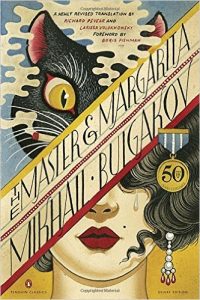
Posted by Andrew S on 15/2/2005, 10:31:56
Funny to see this topic come up. Vika and I were discussing it at dinner last night. She didn’t thing any film of it had ever been made. And, she went on to say, Russian Intellectuals (intelligentsia) would be against it. I understand this, and even though I’d like to see it, I agree. So much of the power of the book, even in translation comes out of Bulgakov’s giving our own imaginations the chance to ‘see’ what’s going on. I know of no other author who can do it as well as he did in M & M. That is not to say Bulgakov is a better writer than say Faulkner or myself, but that if he were a Futbol player, M & M would be a hat-trick (3 goals scored) and a game-saving steal. How’s that for imagination? Hope the committee of bar examiners like it….
Andrew

Posted by Paul L on 18/2/2005, 15:24:28
OK so I shall add bit and piece to my comments on M&M:
Lale had previously mentioned:
Last night as I was reading M&M, I was very surprised to see that the existence of Jesus was in debate.
I had come across an article on Bulgakov that discusses the historical sources on Christianity referenced in Bulgakov’s notebooks for M&M. We find the usual suspects, Renan & Farrar- but also Arthur Drew’s The Christ Myth- the theme of which is simple: Jesus was a mythical character who never existed – and the materials that make up the gospels are simply an amalgamation of various pre-Christian religions. (Which still begs the distinction between Truth and fact- many lanterns but one light).
The article is rather illuminating – especially in suggesting that in order to understand Woland’s character- one cannot rely solely on Christian ideas about Good and Evil, God and Satan. Instead, Bulgakov used characteristics from various pre-christian religions (relying on Drews) to compose his character.
To give a brief but illuminating example:
“Mithras was the suffering Redeemer and mediator between God and the world, while Saoshyant, on the other hand, was the judge of the world who would appear at the end of all time and obtain the victory over Ariman”-the name, significantly, of one of the Master’s literary persecutors in the novel”
That’s all I have time to post for the moment…
The article if anyone is interested:
‘The Mythic Bulgakov: The Master and Margarita and Arthur Drews’ The Christ Myth appeared in Slavic and Eastern European Journal, 1999, Vol. 43, No. 2 pp. 347-360
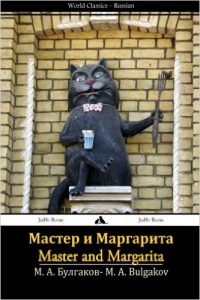
Posted by LadyPurple on 28/2/2005, 14:58:05
Hi all,
It seems that the two months have slipped by without any ongoing discussion on the Master & Margarita. Despite several efforts by some of us, we did not really get into the swing of discussing this masterwork.
Maybe, there is too much to say? Too much to reflect? I saw Guillermo’s review on amazon – I didn’t even finish my own yet. For me M&M has resulted in an overload of themes, questions and investigations… I don’t know how others feel. I am personally not that interested in the religious theme – although I appreciate that others are.
In conclusion, why did I find M&M fascinating?
1. The bitter satire in which he reflects life in Moscow and the SU at the time, the hilarious manifestations of bureaucracy gone wild… The ironic hints in the descriptions of B.’s contemporaries. The play on words and phrases like “secondhand new”…
2. Woland – He is a most intriguing character – first in the Faustian sense of doing evil and good at the same time. He is the most astute observer of the insignificant humans around. Second as the magician who forces people to take a stand, to see the consequences of their actions and wishes materialize in front of themselves; to face the results of their illusions.
3. Margarita as the Queen of Satan’s ball and everything that leads up to it – the surreal imagery that is based on B.’s extraordinary ability for the absurd.
5. Woland’s companions, in particular Behemoth – you can just imagine him dropping down your chimney into the fireplace smoking a cigar and staring you down…
I am least taken really by the Master himself. He clearly was a late addition to the novel. While he adds a certain rationale and provides linkages to and between other characters, I find him somewhat weak. Of course, he lives through his manuscript, like and unlike B himself.
That’s all – over to you
Friederike

Posted by Steven on 19/12/2005, 13:51:45
Master and Margarita is difficult work to describe, and any attempt to summarize the plot would only sound silly. Its various parts – anti-Stalinist satire, love story, Satanic romp and ritual, and biography of Pontius Pilate – are like the ingredients to some exotic dish: each has its own distinctive and delicious savour, yet, while seemingly incompatible, they combine miraculously to create an unforgetable feast.
Bulgakov’s attack on the Soviet system, specifically the ministry overseeing the arts, is surprisingly gentle – more a spoof of bureaucracy in general than of the socialist system. This could explain why the Soviet Union did, in 1972, publish an unexpurgated version of the novel.
Interspersed throughout the novel, and in stark, serious contrast to the playful episodes of the present-day, are exerpts from the Master’s biographical novel of Pontius Pilate, a work which portrays the historical Jesus as no more than a scapegoat caught in a web of long-forgotten political machinations.
Tying together the secular present and the religious-themed flashbacks is Satan, who, with his band of rowdies turns Moscow upside down in a series of hilarious pranks. He recruits Margarita, whose pure, unselfish love for the Master is somehow harmonious with the Devil’s designs. Margarita’s image of goodness and purity is surprisingly enhanced by a destructive rampage, a literal blood-bath, and an orgiastic Satan’s Ball. She is a wickedly alluring version of Dante’s Beatrice and Goethe’s “Eternal Feminine.”
In the end, Bulgakov twists good and evil, blends hedonism with virtue, rocks the foundations of Christianity, and gives Stalin’s moustache a good tweak – all in a novel that is great fun to read.
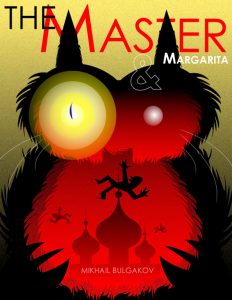
Posted by Ladypurple on 19/12/2005, 11:47:48
Master and Margarita – I found it to be one of those books that linger on for a long time and references pop up even longer in your mind… I am glad you are reading it.
I started putting ideas together for a review (to compete with the thousands out there) but the more I thought about it the less possible it seemed to me to write a review. There is just too much to be said about it. I wouldn’t be able to do the novel justice and also to add something innovative and fresh to the existing discussions about the book.
Btw, M&M has a new film version – an 8-part tv series starting tonight on Russian tv. There are interesting stories about efforts to film M&M – all haunted by problems and failures. This one – one has to wait and see.
You can read about the film version in both the UK Guardian and the New York Times today.
Cheers
Friederike
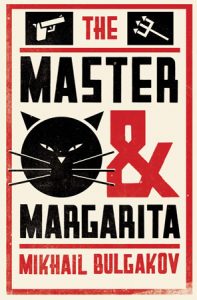
Posted by Paul L on 21/12/2005, 8:21:05
My boring synopsis (which probably means something only to me and one other person who knows my reading habits). M&M is a book that I am sure to read again in the near future. This time I will be better equipped with background material- and I will make more of an effort to follow subtexts. Someone used the word ‘haunting’ and I think it captures a good deal of what M&M does for me… but haunting in a way that the word does not usually connote.
Anyhow, this is one of the few books that I truly enjoyed.

Reviewed by: Dirk Flinthart Date: 22 July 2003
My favourite novel of all time is The Master and Margarita, by Mikhail Bulgakov. I particularly like the Michael Glenny translation (the original is in Russian, of course, and I’ve never had the chance to learn that language.)
For me, the draw of this book is its ability to deal with complex ideas and issues without losing a sense of humour, and the ability to deal with powerful figures and difficult subjects without losing a sense of compassion.
In essence, there are three ‘layers’ to the tale. It is set in Moscow, in the nineteen thirties. Soviet Russian literature is controlled by a few ‘approved’ hacks, and the whole Soviet system is full of corruption and hypocrisy.
Into this mess comes Satan (yes, himself!) and a small entourage, to undertake the traditional Satanic Ball. The arrival of this group signals the beginnings of comic mayhem and chaos across Moscow, as Bulgakov uses these anti-heroes (including a talking cat named Behemoth) to skewer well-known public figures with darkly humorous justice.
The sequences in which Behemoth and his fellow demons create havoc are extremely funny — slapstick comedy overlaying a darker layer of social commentary and real anger from the writer. However, this is only part of the book.
Also in Moscow are two people — a man we know only as The Master, and his mistress, Margarita. The Master recently wrote a book about the meeting between Pontius Pilate and Christ, but because he treated them as real characters, the ‘approved hacks’ of the Communist literary board treated his book with absolute contempt, shattering the man emotionally. He has since fled, and his lover Margarita is desperate to find him again. A good part of the book concerns Margarita’s search for the Master, and her encounter with Satan’s entourage, which brings her back into contact with her lost love.
As if all this wasn’t enough, Bulgakov also brings to life the Master’s manuscript, vividly portraying the meeting between a very human Pontius Pilate, and an equally human — yet still curiously divine — Jesus.
The fusion of the three strands of story is phenomenal. Bulgakov paints legendary and mythical characters with a loving brush that makes them at once human, and still greater. With equal care, he portrays the peasant woman whose spillage of a bottle of sunflower oil initiates the whole cascade of chaos, even though she occupies only a few pages. In between, Bulgakov creates a panoply of complex, wonderfully sympathetic, elegantly flawed Muscovites whose bewilderment and occasional horror at the confusion in their midst is a delight to read.
In my opinion, this is the best novel-length work of fiction I know.
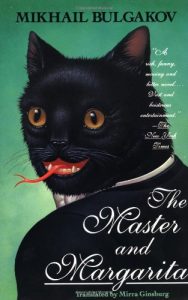
Reviewed by: Ekaterina Mamyshev Date: 12 July 2004
I have to say that this is a very deep book that is quite frightening in its insight into not only former Russian Communist but also contemporary life. It is so true that in today’s world most people look (by various means, not necessarily directly) to the devil in their search for truth, not God. Bulghakov portrayed this very well by his own example. The book is not for everyone: it does the book great injustice to be read exclusively for leisure. As most of Russian literature (and especially Dostoevsky) this is a book that requires thought and application to real life. That is what makes it timeless – it is a masterpiece.
I should add that I read the book in the original Russian. The translation that I found closest to the original and Bulghakov’s style was one by Richard Pevear and Larissa Volokhonsky.
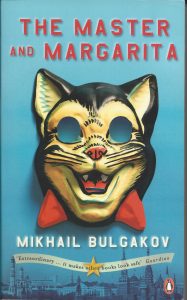
Reviewed by: D.W. Cymbalisty dcymbalisty@hotmail.com
Are you ready to fly through 1930’s Moscow on a broomstick? This book is wild! It must be read for what it is, a comic masterpiece that defies any one specific genre placement… it is like no other book I’ve ever encountered, but comparable perhaps to the supernatural thrillers of Charles Williams. And like Williams’ work, there is much philosophical depth strewn throughout the constant morphings and manifestations. To summarize in one sentence: Here is a fictional account of what happens when the devil comes to visit a city that does not believe in him!
In The Master and Margarita, Bulgakov has us marvellously believing in a huge vodka-drinking talking cat; a woman (Margarita) who becomes an invisible, broom-riding aeronaut; a man who turns into a supersonic flying hog; an animated suit with no-one in it… there is no end to the Bulgamorphic inventiveness. It is no wonder that half of his Moscow ends up in an insane asylum at one point or another.
It is such a unique book that there are many plausible/valid interpretations of who the main character really is. In my opinion, it is Ivan Bezdomny, the disillusioned poet who seems to have internalized the best conception of who Woland (the devil) really was. Bezdomny is a sort of “parenthesis” to the story, he’s there on the first page and he’s there on the last, and though he is not on stage (so to say) as much as some other characters… when the curtain falls, it seems that he is the one who best understands what has happened to Moscow. The only one who seems to know more than him is the full moon overhead… read the book, it is truly ominous.
Note: I did some cross-referencing at no less than 25 different passages and always felt that the Burgin/Tiernan-O’Connor translation was superior in readability to the Pevear/Volkhonsky.
